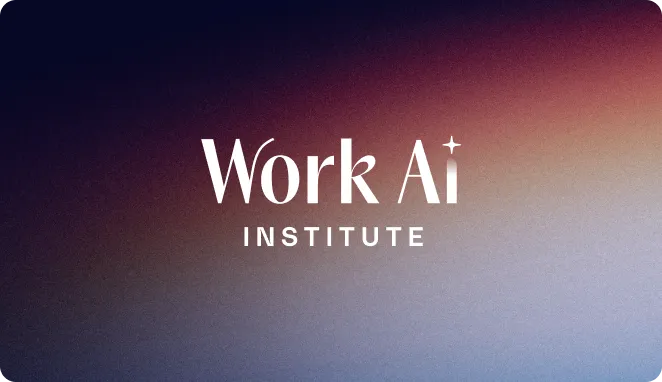- AI in retail helps teams save significant time by automating manual tasks, accelerating decision-making, and providing instant access to information, allowing employees to focus on higher-value work.
- AI enables retailers to deliver personalized, seamless customer experiences and streamline operations by integrating data across channels, supporting faster customer service, smarter onboarding, and improved collaboration.
- By modernizing legacy systems and removing data silos, AI empowers retailers to act on insights in real time, reduce operational inefficiencies, and remain agile in a rapidly evolving industry.
Retail is moving faster than ever — and time has become one of the most valuable resources in the industry.
Between changing tariffs, shifting customer expectations, economic pressures, and increasingly complex tech stacks, retailers are looking for ways to do more with less. That’s where AI comes in. At its core, AI helps retailers save time — by reducing manual work, accelerating decisions, and giving employees instant access to the information they need to act.
AI is helping employees move faster, serve better, and spend time on what matters most. In this blog, we’ll explore five key ways AI is helping modern retailers win back time and stay competitive.
1. Deliver faster, more personalized customer service
Today’s customers expect fast, personalized, always-available support. In fact, 80% of customers are more likely to make a purchase when offered a personalized experience, while 76% express frustration when those expectations aren’t met (source: McKinsey). But for retailers, meeting those expectations is a growing challenge — especially across multiple channels.
AI-powered solutions are helping retailers meet these rising demands. “AI is the ultimate tool for delivering on these expectations, with its ability to intuitively understand customer desires and craft personalized services” (source: Forbes).
AI helps customer support teams move faster and resolve issues more efficiently by:
- Providing instant answers through natural language search
- Equipping virtual assistants to handle common requests 24/7
- Giving associates full customer context so they can tailor responses and reduce back-and-forth
- Summarizing policies and surfacing next steps to speed up resolutions
With Glean, support reps don’t have to dig through documents, systems, or emails. They simply ask a question — like “What’s our return policy for international orders?” — and get a clear, trusted answer in seconds. Managers can build custom agents that automate common service tasks, while associates use Glean to make real-time product recommendations, shortening the path to purchase.
The impact: Shorter wait times, fewer escalations, and faster resolutions that keep customers happy and reduce costs.
2. Build a seamless, AI-powered omnichannel journey
Omnichannel retail is complex, but customers don’t care about your internal systems. Shoppers now assume retailers will offer a seamless experience across every channel — web, mobile, in-store, and support — expecting “consistent information to be at their fingertips, regardless of the channel they choose to engage with” (source: McKinsey).
Social platforms are becoming a major part of that experience. 46% of consumers now buy products directly through social media platforms — more than double the number in 2019 — and 70% use social media to evaluate retailer reviews before making a purchase (source: PwC).
Without AI, delivering that experience means constant coordination, duplicate work, and data silos that slow everyone down.
AI helps retailers:
- Unify customer data from ecommerce, POS, CRM, loyalty programs, and support systems
- Power real-time personalization across channels
- Maintain consistent product and inventory info across platforms
- Enable seamless fulfillment — from BOPIS to curbside pickup
Glean connects siloed systems and makes them searchable — so employees no longer waste time switching between tools or hunting for answers. A store associate can instantly pull up a customer’s purchase history and recommend products. A marketer can quickly analyze cross-channel performance and campaign insights without wrangling spreadsheets.
The impact: Less time lost to disconnected tools and data silos and more time spent delivering a great experience.
3. Cut onboarding and training time in half
Retailers face constant turnover and seasonal hiring. Getting new employees up to speed quickly is critical, but traditional onboarding processes are slow, manual, and resource-heavy. By 2025, 80% of retail executives expect their companies to use intelligent automation, with 40% already implementing some form of it (source: Analytics Insight). To keep up, retailers need to invest in modern tools and training approaches that scale
But attracting talent is also a hurdle. 70% of retail employers struggle to find candidates with the right technical skills, and 82% face challenges finding individuals with appropriate cross-functional experience (source: Indeed)
AI transforms the employee ramp-up process by:
- Delivering answers on demand, so new hires can self-serve
- Reducing dependency on managers and team leads for basic questions
- Customizing learning paths with personalized, AI-guided training
- Improving confidence and consistency from day one
Glean enables seasonal employees to become productive up to 50% faster. Instead of flipping through manuals or waiting for help, they can ask questions in natural language — “How do I process a return?” — and get instant, reliable guidance.
HR and operations teams also benefit. Glean reduces repetitive questions and gives every employee fast access to policies, processes, and resources.
The impact: Faster onboarding, reduced training overhead, and more productive teams, without adding headcount.
4. Turn insights into action with less friction
In a fast-moving market, retailers can’t afford to wait weeks for reports or rely on gut feel. AI helps organizations respond to trends and opportunities in real time — by turning data into decisions, faster.
Retailers are using AI to:
- Summarize and synthesize insights from sales data, customer feedback, and industry trends
- Enable merchandising and marketing teams to spot changes and act quickly
- Reduce development time by helping engineers find code and documentation faster
- Keep cross-functional teams aligned with shared project context
With Glean, innovation doesn’t slow down due to information overload. Product and engineering teams can instantly access key decisions, context, and customer insights. Marketing and merchandising teams can query market trends and optimize campaigns — without waiting on analysts.
The impact: Faster collaboration, shorter launch cycles, and quicker pivots, so retailers stay agile and ahead of the curve.
5. Streamline operations and modernize legacy systems
Retail operations are complex — from supply chain management to pricing strategy to fraud detection. And too often, employees spend hours each week tracking down data, reconciling systems, or responding to delays.
“Some retailers have found it difficult to implement gen AI widely because it requires rewiring parts of the retail organization, such as technical capabilities and talent. Data quality and privacy concerns, insufficient resources and expertise, and implementation expenses have also challenged the speed at which retailers can scale their gen AI experiments” (source: McKinsey)
Despite these hurdles, AI is proving essential to improving retail operations by:
- Modernizing legacy infrastructure with faster, data-driven workflows
- Predicting demand and managing inventory dynamically
- Enabling dynamic pricing based on demand, stock, and competitor activity
- Automating low-value tasks across the warehouse and storefront
Glean connects structured and unstructured data — like supplier contracts, pricing spreadsheets, warehouse emails, and incident reports — and makes it instantly accessible. No more wading through PDFs or toggling between dashboards. Just one interface that saves time and accelerates action.
The impact: Faster decision-making, fewer operational delays, and more bandwidth to focus on strategic growth.
Time is money — and AI gives it back
Retailers don’t just need better tech. They need time. Time to diversify their supply chain. Time to serve customers. Time to onboard and train employees. Time to innovate. Time to make informed decisions.
That’s what AI delivers.
By removing bottlenecks, automating repetitive tasks, and making information instantly accessible, AI helps retailers reclaim time across the business. And with Glean’s Work AI platform, that power is now in every employee’s hands — no learning curve, no complexity, just answers.
Want to see how industry leaders are making it work? Watch our webinar with Etsy on-demand to find out how they’re using AI to deliver faster, smarter retail experiences.









